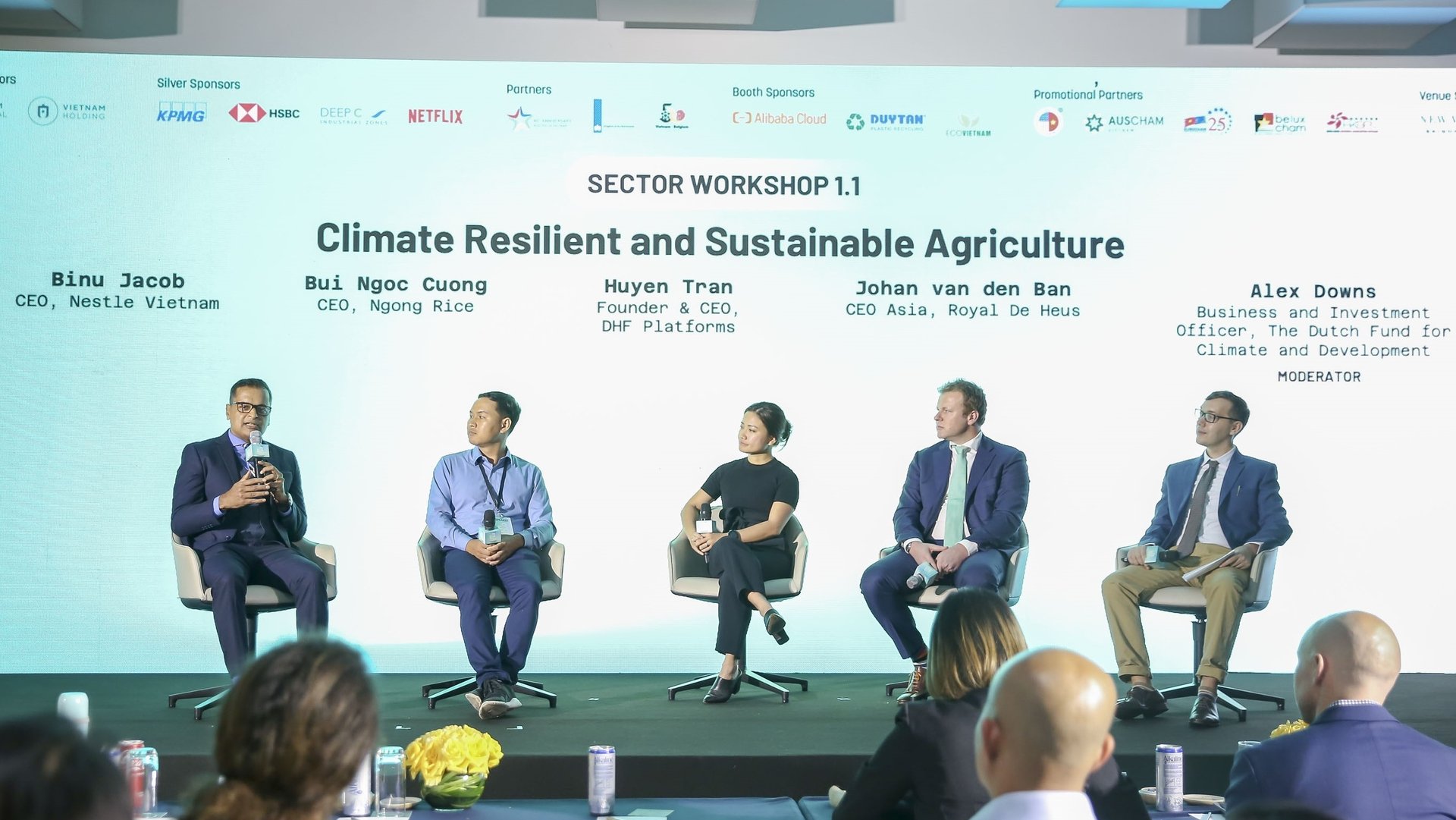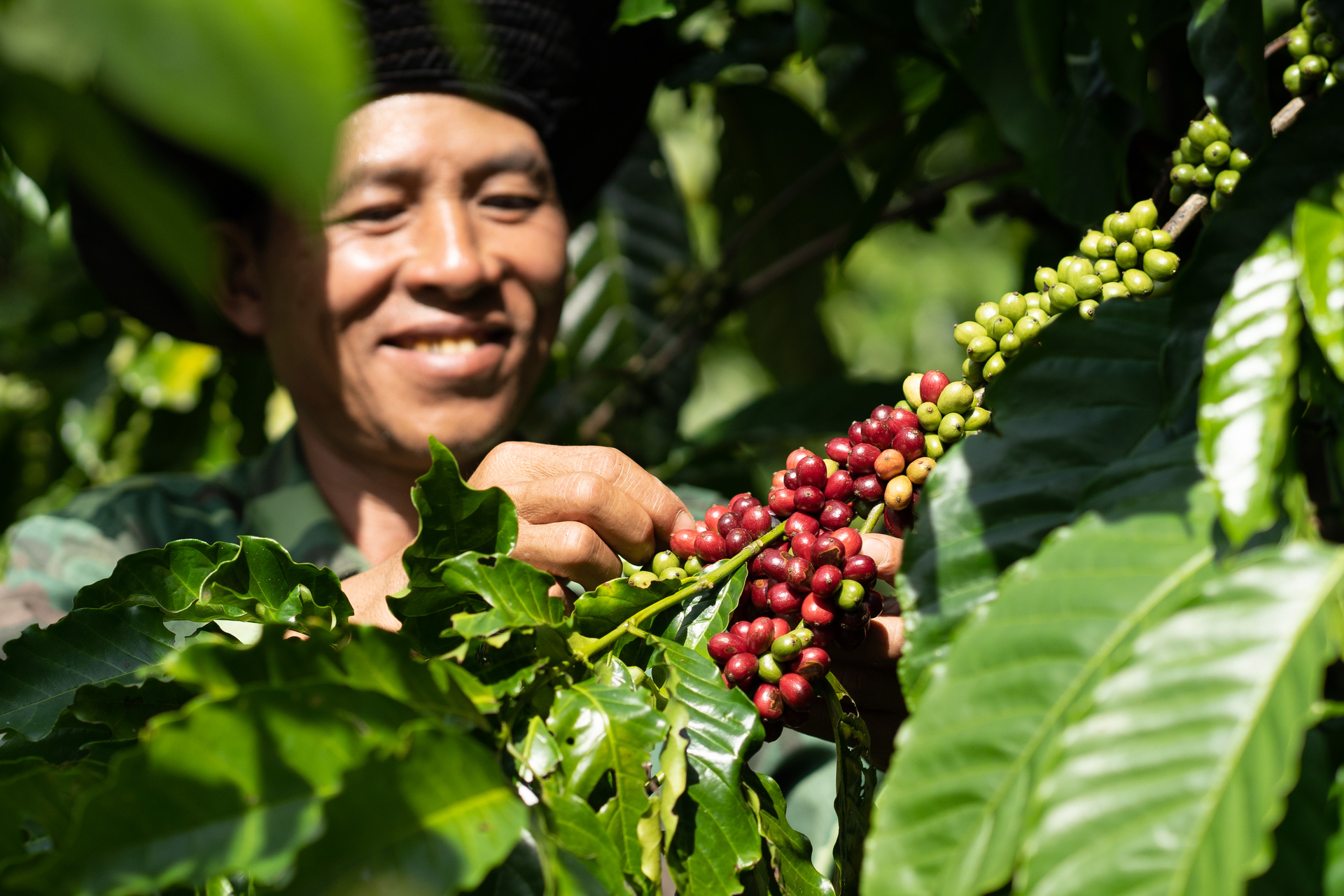November 27, 2025 | 20:53 GMT +7
November 27, 2025 | 20:53 GMT +7
Hotline: 0913.378.918
November 27, 2025 | 20:53 GMT +7
Hotline: 0913.378.918

Mr. Binu Jacob (far left), General Director of Nestlé Vietnam, discussing with 50 ESG 2023 investment businesses at a workshop.
Fifty ESG 2023 investment enterprises recently attended a workshop in Ho Chi Minh City to discuss "Climate change and its increasingly strong impacts on the economy, society and environment". Accordingly, participating businesses concurred that it is imperative to work toward a sustainable future for future generations by adapting to climate change and gradually reducing greenhouse gas emissions.
As a leading company in the food industry, Nestlé Vietnam focuses on solutions to reduce greenhouse gas emissions throughout the supply chain. Furthermore, the company plays a crucial role in promoting Vietnam's transition to sustainable agricultural production. Consequently, Nestlé Vietnam aims to establish a regenerative food system, ensure a sustainable food supply, address climate change, and enhance livelihoods and biodiversity.
According to Mr. Binu Jacob, General Director of Nestlé Vietnam, farmers relied heavily on chemical fertilizers and pesticides in order to boost crop productivity. However, this uncontrolled use of chemicals has adversely affected the quality of cultivation soil. If this farming method persists, there may be no food left for future generations. "We encourage farmers to switch to regenerative agriculture, which is based on soil and crop quality. We believe it can help protect our planet," he said.
The goal of regenerative agriculture is to improve soil quality and fertility as well as protect water resources and biodiversity. Improved soil quality will strengthen the crop's resilience to the effects of climate change, boost productivity, improve farmers' incomes and livelihoods, and increase carbon sequestration.

Coffee farmers participating in the Nescafé Plan program produce coffee according to the "4C" criteria.
Regenerative agriculture has been integrated and implemented in Vietnam within the framework of the Nescafé Plan, a sustainable development program since 2011.
According to the program, Nestlé Vietnam shares regenerative agricultural practices with coffee farmers in the Central Highlands. These practices combine five primary solutions: logical intercropping, application of microbial organic fertilizer, water conservation, biodiversity enhancement and soil quality improvement.
After 12 years of implementation, the Nescafé Plan has helped over 21,000 farmers in the Central Highlands to produce coffee according to the "4C" criteria.
Furthermore, more than 330,000 farmers were trained in sustainable coffee farming, and 63.5 million disease resistant and high-yielding seedlings were distributed. As a result, the program has helped farmers save 40% of irrigation water, 20% of fertilizer, and 20% of production costs without compromising crop productivity.
During the Workers' Month, Nestlé Vietnam Company has collaborated with partners to provide disadvantaged workers with nutritional products in multiple provinces. Nearly 125,000 units of Nestlé Vietnam products including Milo barley milk, MaggiI soy sauce, Nescafé coffee, etc. have been delivered to employees.
Most notably, Nestlé Vietnam cooperated with the Golden Heart Charitable Social Fund under the Vietnam General Confederation of Labor and the Dong Nai Provincial Labor Confederation to donate 2,600 gifts to disadvantaged union members, workers and patients in the cities of Hai Phong, Hai Duong, Ho Chi Minh City and Dong Nai.
Translated by Nguyen Hai Long

(VAN) According to Mr. Vo Minh Thanh, Director of the Tay Ninh Department of Agriculture and Environment, Resolution 57 has created a new development pathway for the locality, shifting from traditional toward modern agriculture.
/2025/11/26/4909-2-154329_878.jpg)
(VAN) Pearl grouper farming in HDPE cages not only delivers economic efficiency but also contributes to protecting the environment, creating jobs, and promoting marine-based experiential tourism.

(VAN) The model of making a living under the forest canopy through the agroforestry system in Van Son commune, Bac Ninh province, is expected to generate an annual income of approximately VND 30 million/ha.

(VAN) Many enterprises in Can Tho are harnessing natural energy and reducing greenhouse gas emissions in their production processes, thereby contributing to the promotion of a sustainable green transition.
/2025/11/24/3536-2-112800_176.jpg)
(VAN) Dong Nai now has tens of thousands of hectares of forests certified for sustainable management, and this area will continue to be expanded in the coming period.

(VAN) Vinh Ha hamlet (Dai Xuyen commune, Hanoi) is shifting away from small-scale farming as households adopt bioscurity into their breeder chicken models.

(VAN) Heavy rains make aquatic species more vulnerable to disease. Proactive water management and high-tech systems help farmers prevent outbreaks and protect yields.